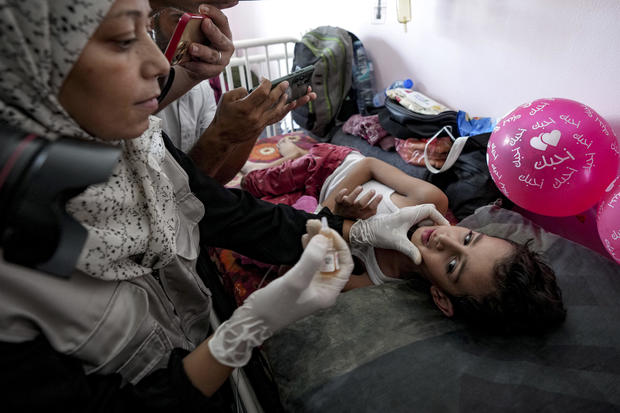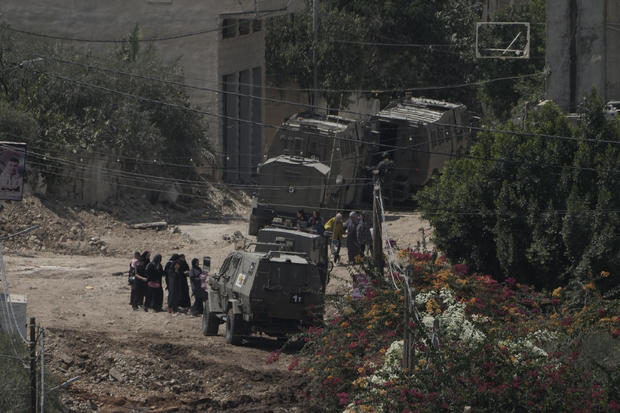
Polio vaccine campaign begins early in Gaza as strikes continue
A campaign to inoculate children in Gaza against polio and prevent the spread of the virus began on Saturday, a day before the large-scale rollout and planned temporary pause in fighting agreed to by Israel and the United Nations World Health Organization.
Children in Gaza began receiving vaccines, the Strip’s Hamas-controlled health ministry announced in a news conference. Associated Press reporters saw roughly ten infants receiving doses of the vaccine in the Nasser hospital in Khan Younis on Saturday afternoon, local time.
“I was terrified and waiting for the vaccination to arrive and for everyone to receive it,” said Amal Shaheen, whose daughter received a dose.
Abdel Kareem Hana / AP
The U.N. World Health Organization had said earlier this week that Israel was expected to pause some of its operations in Gaza on beginning Sunday to allow health workers to roll out their campaign to administer polio vaccines to some 650,000 Palestinian children.
Hamas militants attacked Israel and Israel launched a retaliatory offensive on Gaza.
He is one of hundreds of thousands of children who missed vaccinations because of the fighting between Israel and Hamas.
The boy’s mother, Neveen Abu El Jidyan, told CBS News on Tuesday she has been able to do very little for her son due to the dire conditions in the camp for displaced Palestinians where they’re living.
“We haven’t given him any treatments. We live in a tent and there is no medication,” El Jidyan, 35, told CBS News.
Israeli leaders agree to rare pause in fighting in Gaza amid polio crisis
02:18
El Jidyan, who has nine other children, was forced to move her family from the north of Gaza to a tent in Deir el-Balah because of the war.
Abdul Rahman had been developing normally and was almost walking, El Jidyan said, when he started throwing up and got a fever.
“I took him to the hospital and they told me there is nothing they can do. They know his condition, but there is no treatment,” she told CBS News. “When the virus hit him, he changed in one night.”
El Jidyan said she believed the unsanitary conditions where her family has been forced to live caused her son’s illness.
“Our living conditions — we don’t have clean water, clean food. We live in a tent and nothing is clean here,” she said.
Polio was eliminated from most parts of the world as part of a decadeslong effort by the WHO and partners to wipe out the disease.
Healthcare workers in Gaza have been warning of the potential for a polio outbreak for months, as the humanitarian crisis in Gaza has deepened throughout the war which broke out after Hamas-led militants stormed into southern Israel, killing some 1,200 people and abducting around 250. Israel’s retaliatory offensive has killed more than 40,000 Palestinians, according to Gaza’s Health Ministry, which does not say how many were militants.
Palestinians remain on edge
Hours earlier, Gaza’s Health Ministry said hospitals received 89 dead on Saturday, including 26 who died in an overnight Israeli bombardment, and 205 wounded — one of the highest daily tallies in months.
Meanwhile, parts of the West Bank remained on edge Saturday as Israel’s military continued its large-scale military campaign, the deadliest since the Israel-Hamas war began, and two car bombings by Palestinian militants near Israeli settlements left three soldiers injured.
Two car bombs exploded early Saturday in Gush Etzion, a bloc of Israeli settlements in the West Bank. Israel’s military killed both Palestinian attackers after the bombs exploded in a compound in Karmei Zur and at a gas station, Israel’s military said. Three Israeli soldiers sustained minor injuries.
Palestinian health officials said Israel was holding the bodies of the attackers, naming the men as Muhammad Marqa and Zoodhi Afifeh.
Majdi Mohammed / AP
Hamas did not claim the men as its fighters but called the attack a “heroic operation” and a “new slap to the occupation’s security system” in a statement early Saturday. The Palestinian militant group said earlier this month after a bombing attack in Tel Aviv that it would continue such attacks.
The bombings took place as Israel continued its large-scale raid — which includes destruction of infrastructure, airstrikes and gunbattles — into urban refugee camps in the cities of Jenin and Tulkarem, in the north of the volatile West Bank. About 20 Palestinians have been killed since Israel’s incursion started Tuesday, causing alarm among the international community that the war might widen beyond the Gaza Strip.
Israel has described the operation as a strategy to prevent attacks on Israeli civilians, which since the start of the war have increased in the West Bank, including near settlements that the international community largely considers illegal. In return, the Palestinian Health Ministry noted a surge in Palestinian deaths by Israeli forces, with 663 killed in the West Bank in the nearly 11 months since the war began.
In central Gaza, Israeli airstrikes hit a multi-story building housing displaced people in and around Nuseirat, a built-up refugee camp in central Gaza, further south in Khan Younis and northward in Gaza City, officials at hospitals in the three areas said on Saturday morning.
Among the dead were a physician and his family and a child whose right leg had been previously amputated, according to an initial list of casualties from the hospital and footage released on Saturday by civil defense officials who operated under Gaza’s Hamas-run government.
The United States, Qatar and Egypt have spent months trying to mediate a cease-fire that would see the remaining hostages released. But the talks have repeatedly bogged down as Netanyahu has vowed “total victory” over Hamas and the militant group has demanded a lasting cease-fire and a full withdrawal from the territory.
More
More
Source: cbsnews.com
